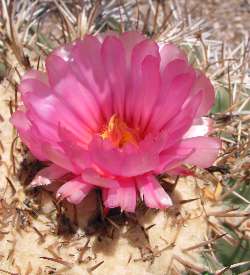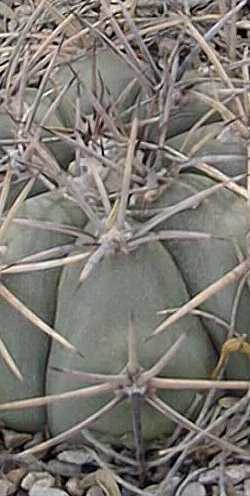Devil's-Head Cactus, Biznaga Meloncillo
Scientific Name: Echinocactus horizonthalonius Hildmann
Synonym: Meyerocactus horizonthalonius
Family: Cactaceae
Sunset®: 12-24
USDA: 8b-10
Frost Tolerance: Hardy to 14° F (-10°C)
Sun Exposure: Full sun
Origin: Mexico (Nuevo Leon, San Luis Potosi), USA (Arizona, New Mexico)
Growth Habits: Cylindrical, generally solitary, flattened globose, glaucous green stem slowly growing to 12 inches tall (30 cm), 6 inches in diameter (15 cm) or more; 5 to 13 ribs; round areoles; flattened reddish spines; 3 to 5 centrals, 0.1 inch thick (2.5 mm); 6 to 9 radials, 1 inch long (2.5 cm).
Watering Needs: Water carefully, needs very little water, keep dry in winter, needs good drainage
Propagation: Seeds

Echinocactus horizonthalonius in early May at the DBG (1953 3863 01 01)
Echinocactus horizonthalonius is the smallest of the Echinocactus, the only one that is will bloom as a container plant.
The variety Echinocactus horizonthalonius var. nicholii from southern Arizona, and in Sonora in the Sierra del Viejo is classified as endangered. It has typically 8 ribs, 3 centrals, 5 radials.
Blooming Habits:
The Echinocactus horizonthalonius has pinkish-red flowers 2 to 3 inches in diameter, that are produced from the end of March to late May. The red fruits are oblong, semi dry, containing black seeds. They mature in May-June in habitat.
Culture:
This Echinocactus comes from areas receiving 8 to 12 inches of water a year (20-30 cm) with punishing heat and sun. It needs little water and a lot of sun. Most varieties are coming from soils derived from limestone and do better with some limestone in the soil mixture.
Desert-Tropicals is dedicated to provide gardening advice, gardening ideas, and information about flower of all kind for landscape and collections.We try to check carefully the identification of the plants on the illustrations as well as the other information from the page, but occasionally errors do occur. if you notice anything that needs to be changed please contact us.Thanks.
© 1998-2020 Philippe Faucon, All Rights Reserved.
